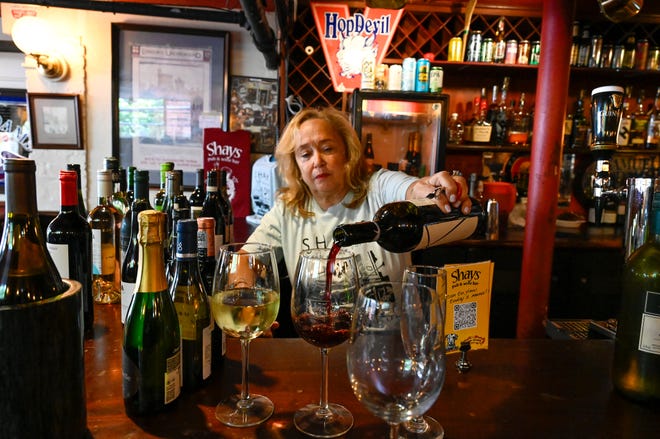CAMBRIDGE — Multiple manhole explosions shut down Harvard Square for hours on Wednesday, prompting the evacuation of nearby buildings, shuttering businesses, and surprising Harvard students moving into dormitories, officials said.
Two manholes caught fire on Brattle Street Wednesday morning, followed hours later by a third manhole fire, requiring an all-day emergency response to the area, Acting Cambridge Fire Chief Thomas Cahill said in a video posted on X, the platform formerly known as Twitter.
A firefighter was taken to a local hospital to be treated for smoke inhalation and has since been released, said Jeremy Warnick, a spokesperson for Cambridge Fire.
Shortly before 6 p.m., firefighters were clearing the area, the fire department said on X.
Eversource remained on site to attend to a few businesses that had lost power, Warnick said. No residences lost power, he said.
It was not immediately clear Wednesday night when power was expected to be restored, he said.
Eversource brought a generator to the area to supply customers with backup power while permanent repairs were made, a spokesperson for the company said. Customers will be hooked up to the generator once the city’s wire inspector completes testing and grants approval.
The explosions sent smoke billowing into the air and ground traffic to a halt on busy streets.
When Cambridge firefighters arrived around 9 a.m. to the scene at 27 Brattle St., one manhole was on fire, Cahill said. Shortly after, a second manhole popped and was on fire, he said.
“All the manholes are connected to each other, so generally if you have a problem with one, if you are unable to shut the power down, it will trickle to the next one,” Cahill told reporters at the scene, according to video broadcast by WCVB.
The area was closed to cars and pedestrians as firefighters ventilated carbon monoxide from several nearby buildings, officials said. Crews from Eversource were “repairing an underground electric cable,” the utility said shortly before noon.
Cahill said the cause of the fires must still be determined but that “we believe everything is related to electrical” issues.
There were no injuries, but a firefighter was treated for smoke inhalation, police said.
JFK Street was reopened to traffic shortly before 12:30 p.m., but vehicular and pedestrian traffic entering the Brattle Street area was still diverted as of early evening, Cambridge police said on X.
Grace Liu, a Harvard University sophomore helping freshmen move in Wednesday, said the fire made a stressful day even more so.
“With all the moving, there is already a lot of traffic, which this adds to,” Liu said. “I can feel the parents’ stress.”
Fire officials spent at least the first 45 minutes evacuating buildings, Cahill said. Many nearby businesses had carbon monoxide readings well over 100, he said.
“Once the buildings were evacuated we did our best to get the [carbon monoxide] levels down,” he said.
As of late afternoon, businesses still had carbon monoxide levels between 25 and 30, Cahill said.
“There really isn’t a good [carbon monoxide] number. Anything above zero you should be concerned about,” he said. “At 35 we automatically evacuate buildings, whether they are residences or businesses.”
By early evening, carbon monoxide levels returned to normal in nearby buildings, Warnick said.
Katie Walsh, an employee at a Moleskin stationary store near the fire, said she learned about the explosion on her way to work. She was told to unlock the door to air out the building and leave.
Tomas Arroyo, a Harvard freshman who moved into his residence hall last week, said he walked over to see what the commotion was.
”I was thinking it would be something bigger with the traffic and all the firetrucks,” Arroyo said.
Eversource said its crews were fixing an underground electric cable in the aftermath of the fire.
“We’re working with @CambridgePolice and @CambridgeMAFire to make the area safe and there are currently no related power outages for our customers,” the utility said on X.
Travis Andersen of the Globe Staff contributed to this report.

